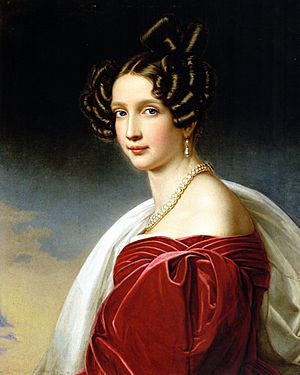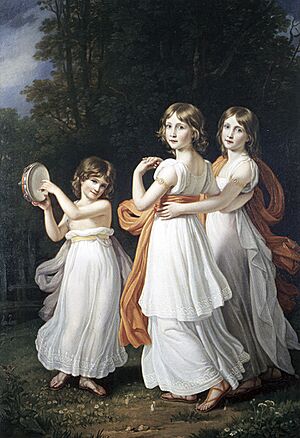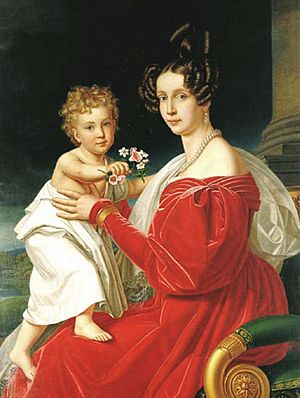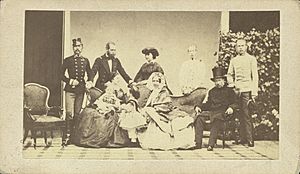Princess Sophie of Bavaria facts for kids
Quick facts for kids Princess Sophie of Bavaria |
|||||
|---|---|---|---|---|---|
| Archduchess of Austria | |||||

Portrait by Joseph Karl Stieler, 1832
|
|||||
| Born | 27 January 1805 Nymphenburg Palace, Munich, Electorate of Bavaria |
||||
| Died | 28 May 1872 (aged 67) Vienna, Austria-Hungary |
||||
| Burial | Imperial Crypt | ||||
| Spouse |
Archduke Franz Karl of Austria
(m. 1824) |
||||
| Issue Detail |
|
||||
|
|||||
| House | Wittelsbach | ||||
| Father | Maximilian I Joseph of Bavaria | ||||
| Mother | Caroline of Baden | ||||
Princess Sophie of Bavaria (born Sophie Friederike Dorothea Wilhelmine on January 27, 1805 – died May 28, 1872) was an important royal figure. She was the daughter of King Maximilian I Joseph of Bavaria and his second wife, Caroline of Baden. Sophie was the identical twin sister of Queen Maria Anna of Saxony. She became an Archduchess of Austria when she married Archduke Franz Karl of Austria. Her oldest son, Franz Joseph, later became the Emperor of Austria and King of Hungary. Her second son, Maximilian, also briefly ruled as the Emperor of Mexico.
Contents
Early Life and Family (1805–1824)

Princess Sophie Friederike Dorothea Wilhelmine was born on January 27, 1805. Her birthplace was Nymphenburg Palace in Munich. She was the fourth child of King Maximilian I Joseph of Bavaria and Princess Caroline of Baden.
People said Sophie was her father’s favorite daughter. However, she felt a stronger connection to her mother, whom she loved very much. Sophie also adored her twin sister Maria Anna. She was very close to all her sisters.
Life as Archduchess of Austria (1824–1872)
On November 4, 1824, Sophie married Archduke Franz Karl of Austria. Her older half-sister, Caroline Augusta of Bavaria, had already married Franz Karl's father, Emperor Francis II, in 1816. Sophie and Franz Karl had six children together. Emperor Francis II was very fond of Sophie. Even though Sophie and her husband did not have much in common, she was a caring and loyal wife. Franz Karl loved and respected her.
Sophie was very devoted to all her children. She especially cared for Franz Joseph. Her son Ferdinand Maximilian was also her favorite. Sophie was known for being strong-willed and a natural leader. Yet, she was also friendly and social. She was very dedicated to her family and the Habsburg empire she joined. She enjoyed court life, dancing, art, literature, and horse riding.
Sophie had a strong desire to see her oldest son become the ruler of Austria. This goal was a constant topic in Austrian politics. At the time, people sometimes called her "the only man at court." During the Revolution of 1848, she convinced her husband to give up his right to the throne. This allowed their son Franz Joseph to become emperor instead.

After Franz Joseph became emperor, Sophie became a very powerful figure behind the scenes. Historically, Sophie is often remembered for her difficult relationship with Franz Joseph's wife, Sisi. Sisi was also Sophie's niece. Elisabeth felt that Sophie was strict and demanding. However, Sophie's diaries and letters often described Elisabeth in a pleasant way. Sophie had good relationships with her other daughters-in-law. She was a caring mother-in-law to Archduchess Maria Annunziata.
Sophie kept a detailed diary for most of her life. These writings tell us a lot about life at the Austrian court. In 1867, she was deeply saddened by the execution of her second son, Maximilian, in Mexico. She never fully recovered from this shock. After this, she stopped appearing in public life. Sophie died from pneumonia in 1872.
Her Children
Sophie and Franz Karl had six children. Two of them became emperors.
| Name | Born | Died | Notes |
|---|---|---|---|
| Franz Joseph | August 18, 1830 | November 21, 1916 | Became Emperor of Austria. He married his cousin Elisabeth. They had children. |
| Maximilian I of Mexico | July 6, 1832 | June 19, 1867 | Became Emperor of Mexico. He was executed by firing squad. He married Charlotte. They had no children. |
| Karl Ludwig | July 30, 1833 | May 19, 1896 | Married three times and had children. He was the father of Archduke Franz Ferdinand. Franz Ferdinand's assassination in 1914 helped start World War I. Karl Ludwig was also the grandfather of Austria's last Emperor, Charles I. |
| Maria Anna | October 27, 1835 | February 5, 1840 | Died when she was a child. |
| Stillborn son | October 24, 1840 | October 24, 1840 | |
| Ludwig Viktor | May 15, 1842 | January 18, 1919 | He never married. |
Sophie in Movies and Shows
Sophie's character has appeared in many films, ballets, and musicals.
- In the Sissi films (1955–1957), actress Vilma Degischer played Sophie. She was shown as a very strict mother-in-law to the young Empress Sisi. This image of Sophie as a tough villain became very popular because of these films.
- In the 1974 miniseries, Fall of Eagles, English actress Pamela Brown played Sophie.
- Mayerling, a ballet from 1978 by Kenneth MacMillan, shows Sophie in a slightly more understanding way.
- Elisabeth, a musical from 1992, shows Sophie as someone who tries to cause trouble for her daughter-in-law. However, newer versions of the musical have made her character a bit softer. They add scenes and a song that help explain why Sophie acted the way she did.
- In Sissi, l'impératrice rebelle, a 2004 French TV film, Stéphane Audran played Sophie.
- In the 2009 European mini-series Sisi, Martina Gedeck played Sophie. This version showed a more balanced view of her character.
- The 2022 Netflix series The Empress features Sophie, played by Melika Foroutan.
Honours
 Austria-Hungary : Dame of the Order of the Starry Cross
Austria-Hungary : Dame of the Order of the Starry Cross
See also
 In Spanish: Sofía de Baviera para niños
In Spanish: Sofía de Baviera para niños
 | Kyle Baker |
 | Joseph Yoakum |
 | Laura Wheeler Waring |
 | Henry Ossawa Tanner |


